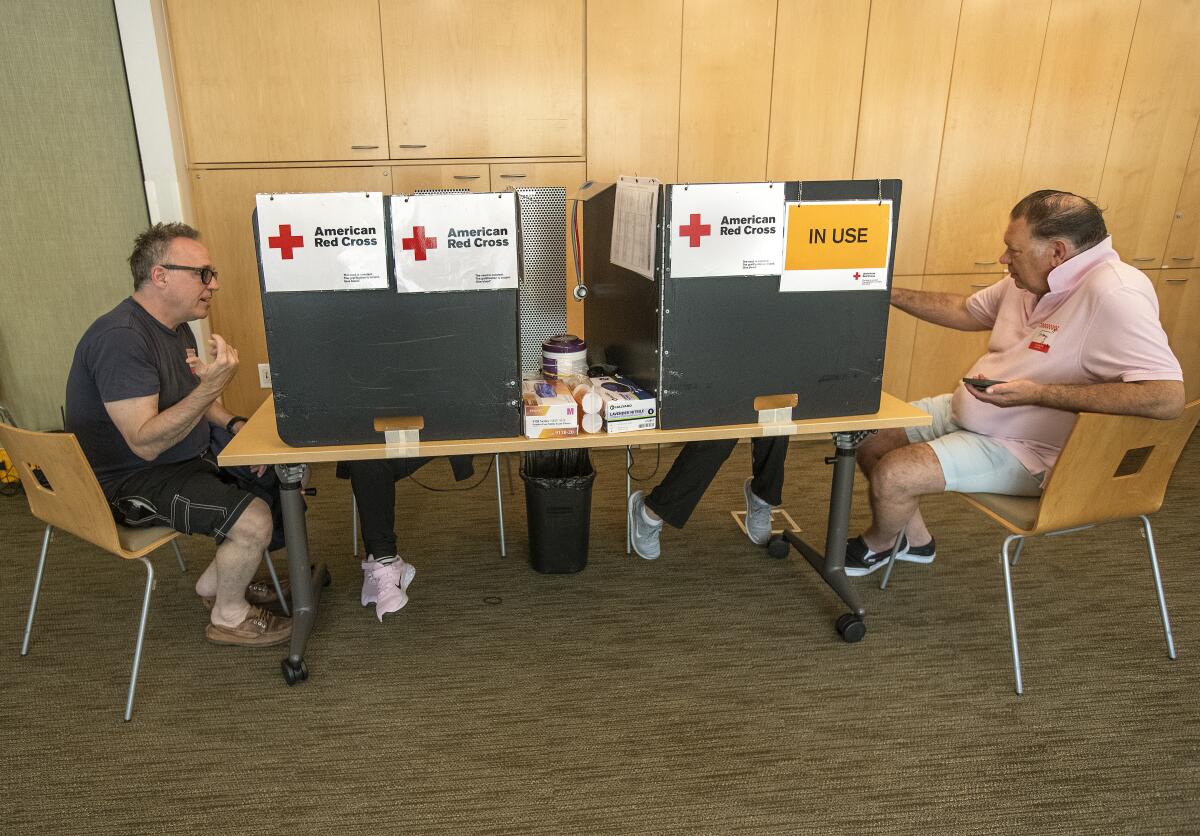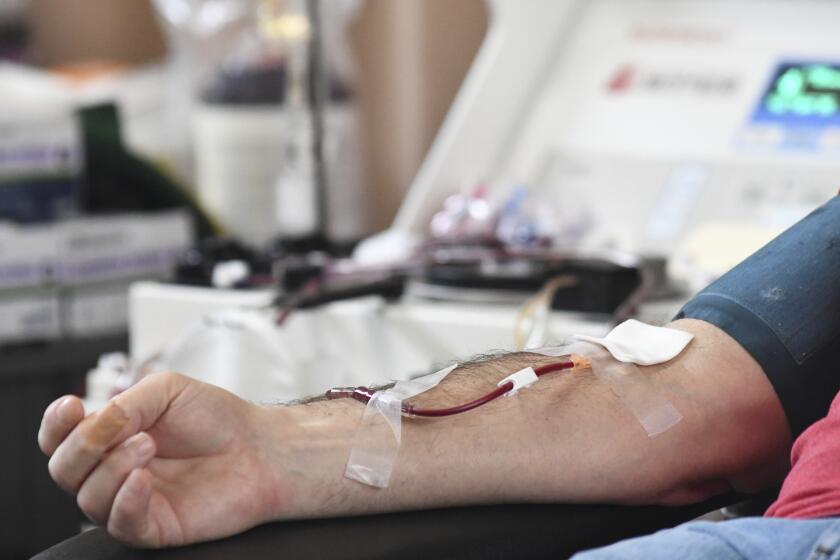Column: Two gay men walk into a Red Cross blood donation center ...

The American Red Cross had a blood drive at Malibu City Hall the other day. In a first-floor community room, donors lay on gurneys, plastic tubes snaking from their arms, tended by nurses. Afterward, they snacked on mini-Oreos and sipped from tiny juice boxes.
It all seemed very routine.
But this was a totally new experience for Jeremy Walker, 55, and his husband, Judd Stark, 59, gay men who came of age at the frightening dawn of the AIDS era. Together for 30 years, and married for almost 10, they had not been able to donate blood due to federal rules that discouraged donations from individuals with increased risk for transmitting HIV, the virus that causes AIDS. For a very long time, men who have sex with men were presumed to represent a danger to the blood supply.
“It’s always fun not to be excluded, even if you don’t want to be included,” said Walker as the couple and I chatted in a shady courtyard at the Malibu Country Mart before heading over to City Hall and the blood drive.
In 1983, two years after HIV/AIDS was discovered in the United States and before there were reliable tests, the Food and Drug Administration banned men who have sex with men from ever donating blood. People were terrified after some high-profile incidents of HIV being transmitted during blood transfusions. Who could forget the story of Ryan White, the Indiana teenager who contracted AIDS after a 1984 transfusion and then was barred from attending his school? Or Elizabeth Glaser, the Santa Monica woman who founded the Pediatric AIDS Foundation after she contracted HIV from a transfusion given to her during childbirth in 1981 and passed it on to her children?

In 2015, the FDA lifted its total ban and replaced it with a one-year abstinence requirement for gay men. But that still struck pro-LGBTQ+ groups as stigmatizing an entire group of people. Five years later, amid the COVID- 19 pandemic in 2020, the FDA shortened the abstinence period to three months.
Then just last month, the agency finalized new guidelines for determining the eligibility of each prospective blood donor — not just gay men or, say, sex workers — individually, with a series of questions about their recent sexual history.
New rules allow sexually active gay and bisexual men in monogamous relationships to give blood in the U.S. All donors will be screened with a questionnaire.
“The Red Cross recognizes the hurt [the earlier] policy has caused and that these are just the first steps in repairing relationships with the broader LGBTQ+ community,” a spokeswoman for the nonprofit said in a statement on the new FDA guidelines.
From now on, all prospective donors will be deferred if they report “having a new sexual partner, or more than one sexual partner in the past three months, and anal sex in the past three months.”
The new guidelines were developed after a two-year pilot study determined that asking all donors about the number of partners and specific behaviors was as effective at protecting the blood supply as writing rules aimed at any one population. (One group remains permanently deferred: Anyone who has ever been infected with HIV cannot give blood.)

The new approach won’t go fully into effect until later this summer. At Malibu City Hall, Walker and Stark each answered the current donor questionnaire on their phones and had a private hallway conversation with Nina Minton, the on-site Red Cross coordinator.
“I haven’t used the word ‘anal’ this much since the ’80’s,” Stark joked afterward.
This welcome change in public policy comes at a time when gay and trans rights are increasingly under attack, empowered by an ultraconservative Supreme Court. Red-state legislatures are passing dozens of anti-LGBTQ+ laws, drag queens who read books to children are being demonized, and parents of schoolchildren are coming to blows over Pride Month celebrations.
The FDA’s revised guidelines would loosen bans on some gay and bisexual men donating blood, but keep other dubious restrictions.
“I mean, this is not Selma, Ala., but it is a moment,” said Walker, a Malibu native who co-founded an independent-film publicity firm with Stark in New York in 1999. “To quote Mary Tyler Moore’s mother in ‘Ordinary People,’” he added, “‘I thought we were all finished with that.’”
Stark, who grew up in Mansfield, Ohio, didn’t come out until he moved to New York in his twenties. “I had to get the hell out of there to a place that was safe,” he said, “and New York was closer than San Francisco. The hatred we are starting to see is very reminiscent of why I got out of Ohio in the first place.”
He left the film publicity business and now works for CRI-Help, a half-century-old North Hollywood nonprofit drug and rehab center.
As conservative lawmakers introduce a record number of anti-transgender bills, abortion and trans rights advocates see mirrored fights for bodily autonomy.
On Friday, a spokeswoman for the American Red Cross told me that there had been a “concerning shortfall” in blood donations over the last month. Although the country is not experiencing the kind of national blood shortage crisis that we did in January 2022, the organization collected blood from 26,000 fewer people than it needed last month to meet the needs of patients. If you are moved to donate blood, it’s pretty easy: You can visit the Red Cross website, call 1-800-RED-CROSS or download the Red Cross Blood Donor app.
Walker and Stark discovered that their monogamous relationship and sexual practices qualified them to give blood even before the new rule went into effect. However, risks from sex are not the only health issues that get screened. It turned out that Walker’s blood pressure was slightly too high, and he was not allowed to donate until he could bring it down.
“I’m surprised,” he said, “but I’m motivated.”
More to Read
A cure for the common opinion
Get thought-provoking perspectives with our weekly newsletter.
You may occasionally receive promotional content from the Los Angeles Times.















